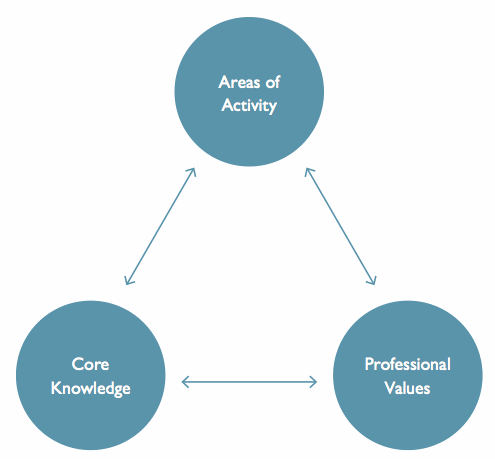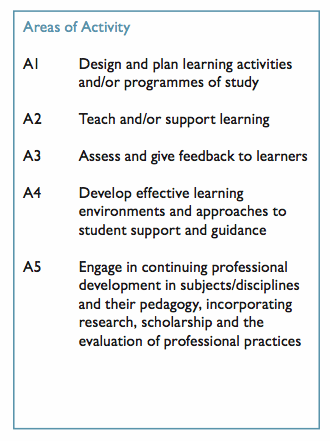As I started in my post on Friday,
Initial Musings on Reflective Practice for #fslt12, I have been thinking about the elements of the UK Professional Standards Framework for teaching and supporting learning in higher education 2011 as per our first assignment for the
First Steps into Learning and Teaching in Higher Education mooc.

Comprised of 3 dimensions–Areas of Activity, Core Knowledge, and Professional Values–our assignment is:
Choose one of these three dimensions. What are your initial thoughts about the points listed in that dimension? Could you demonstrate understanding of and engagement with any of the points listed?
I spent the last few days considering which of these 3 dimensions are the best for me to work with with my summer class that I am teaching that begins this coming week at Pace University, NURS 840: Teaching and Learning in Advanced Practice Nursing). While I was the co-developer of this course back when the program itself was being put together and as I have taught the course since its inception, I thought this may be a great course to keep in mind regarding this mooc assignment. Why not consider this assignment in the real context of my course that is again about to begin. Who knows, some of my nursing students may even see what I am considering and give me some feedback!?
 I think I am going to focus on the Areas of Activity, which seems to focus around the teaching and learning processes themselves.
I think I am going to focus on the Areas of Activity, which seems to focus around the teaching and learning processes themselves.
While I have taught in some capacity my entire life (with my teaching over the past 10 years occurring on my own time, and not as part of my full-time position), I believe there is always an opportunity to improve. I firmly believe that reflective practice is an element in this. While considering Brookfield’s work on the 4 lenses related to educational reflective practice (see his excellent paper integrating these in practice, Radical Questioning on the Long Walk to Freedom:
Nelson Mandela and the Practice of Critical Reflection), I am going to consider my own teaching and learning through another perspective — Consider the Opposite of What I Like (COWIL).
If I am working in a certain practice or teaching or learning or working in a way that seems to get what results I want, or that feels right, or that somehow makes sense to me, then that will probably work somewhat well for those who also approach the phenomenon in a similar way.
How about others? How about those people who need to do when I want to talk, or need to listen when I want to draw or even who believe teaching is objective when I believe teaching is a manifestation of power relationships where a certain message is taught while others are often (un/in)-tentionally suppressed?
Let me instead COWIL.
Now, I am still developing this frame, so feedback here will be well appreciated.
As I am planning for my first on-campus course of my course, how can I do this? Let me consider this from the A1 frame–“Design and plan learning activities and/or programmes of study.” When I am developing my course, or in the practical realm, my actual 3 hour class session, I will develop this as I normally would, focusing on the content we already identified and using the methods I like. Then, review it all again so I can Consider the Opposite of it, and then acknowledging that some of these things may not be especially useful for me, but prepare introduce or discuss or somehow address them in class for the benefit of those learners who may need to see those things.
While I am still building this frame, it is heavily influenced by using actor-network theory (ANT) to describe a current phenomenon, thereby allowing it to be interpreted from a variety of alternate perspectives. For more in ANT, consider this chapter by John Law or text by Fenwick and Edwards.


